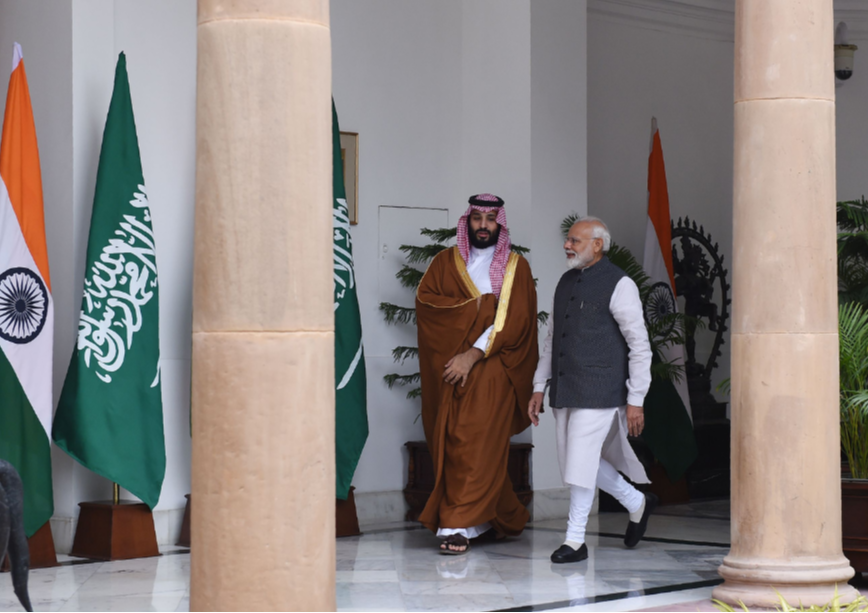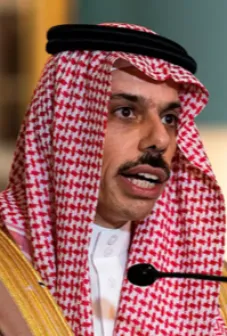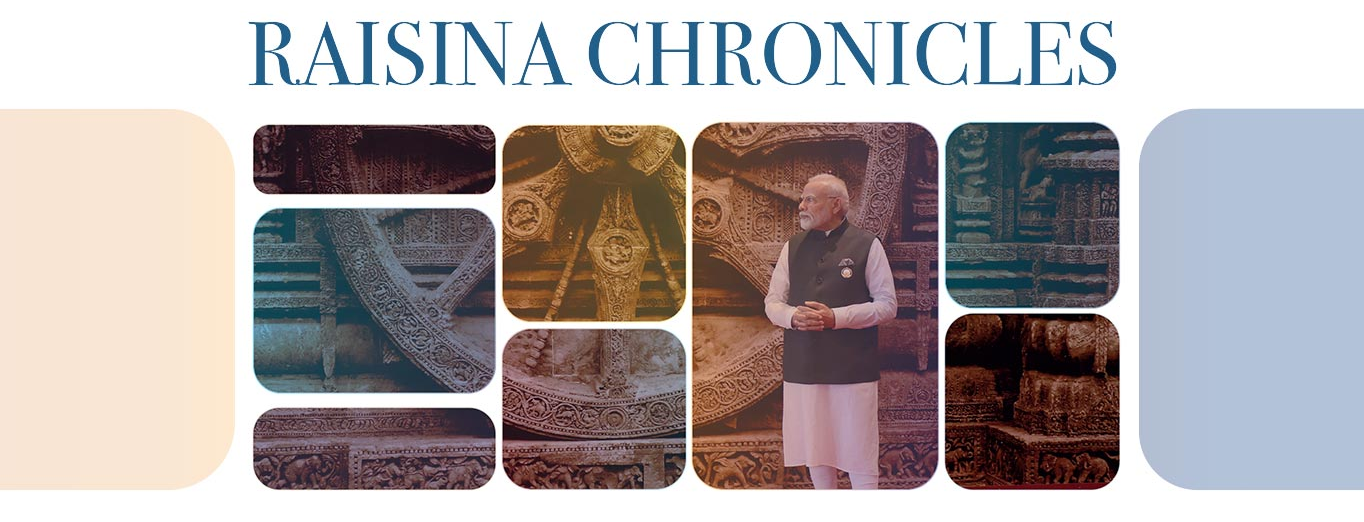
This article is a part of the series - Raisina Chronicles 2024
Relations between India and the Arab world date back to centuries; historic interactions between the Arab and Islamic world and India resulted in lasting cultural linkages between us. Flourishing through trade, when Arab merchants ventured into the Indian spice trade, and rooted in human connections, sustained engagement between our nations has brought us closer. Enhanced trade gave way to increased cultural exchange and knowledge transfer. Global challenges and a synergy of interests intersected to produce a robust strategic partnership between India and the Kingdom. We, in the Kingdom, believe this partnership will only grow stronger, through deeper and broader engagement.
Relations between India and the Arab world date back to centuries; historic interactions between the Arab and Islamic world and India resulted in lasting cultural linkages between us.
At the core of any thriving relationship is its human element. The friendship between both countries sustains our cooperation and enables more cultural exchange. More people from India visited the Kingdom in the past year than ever before. In 2022, 1 million travelers from India travelled to the Kingdom. By the end of 2023, this figure increased by 52.68 percent nearing 1.7 million visitors; we are targeting 12 million visitors by 2030. The average number of inbound flights in 2023 reached 256 per week (a 25-percent increase from 2022), and we are aiming to increase inbound flights from India to 290 per week. Indian nationals residing in the Kingdom form its largest expatriate group, contributing value and further strengthening the friendship between our nations through cultural engagement.
Realising the strategic importance of this relationship, the leadership in both countries are determined to take this decades’ long partnership to new heights of collaboration, unlocking the immense potential it holds, not only for our two nations, but also for the health and resilience of the global economy. In today’s interconnected world, where challenges and threats transcend borders, it is incumbent upon us, as leading regional and international actors, and integral G20 members, to leverage our partnership and international position to enhance shared efforts towards a future that prioritises cooperation over confrontation and development over conflict. We are highly motivated to work towards a prosperous future, which meets the expectations of our populations, especially the youth in both countries.
Both our countries carry significant weight within the global economic architecture. As leading G20 members, this weight underpins the importance of developing trade and investment relations, and the value this can generate on the world stage, jointly addressing issues varying from food and energy security to supply chain resilience and facilitating investments.
We were pleased to take part in the successful G20 summit, in New Delhi, which witnessed the announcement of an MOU to establish the India-Middle East Europe Corridor (IMEC)–an ambitious cross-continental project that will link West Asia and the Middle East to Europe via rail and shipping lines. The IMEC will comprise two separate corridors: the East corridor, connecting India to the Arabian Gulf, and the Northern corridor from the Middle East to Europe.
The massive project will significantly impact development and growth in the global economy due to the planned upgrade in infrastructure, connectivity, flow of goods, and economic integration. In addition, the MOU includes building pipelines to include highefficiency, reliable cross-border data transmission cables, as well as enhancing energy security, through a development of green transit corridors to export electricity and hydrogen.
The massive project will significantly impact development and growth in the global economy due to the planned upgrade in infrastructure, connectivity, flow of goods, and economic integration.
From a bilateral perspective, trade relations have been on an upward trajectory in recent years. In 2022, bilateral trade reached $52 billion, registering a 23-percent increase over the previous year. Figures are still holding strong for 2023, indicating that bilateral trade by the end of the year’s third quarter is estimated to have exceeded $35 billion. Also, in 2022, both India and the Kingdom achieved the highest growth rates among G20 countries. Both countries maintained positive growth levels during the past year, with India recording 6.3 percent GDP growth, exceeding G7 economies for two successive years. The positive indicators and sustained growth projections both countries have been receiving underscore the integral positions they occupy within the global economy.
The latest visit of HRH Mohamad Bin Salman Al Saud, Crown Prince and Prime Minister to India, in September 2023 sought to solidify and deepen the bonds of friendship and strategic partnership between our two nations. It was an opportunity to review and reflect on the developments in cooperation since HRH’s previous visit in February 2019, as well as Prime Minister Narendra Modi’s historic visit to the Kingdom in October of the same year, which resulted in the formation of the Strategic Partnership Council (SPC) as the highest cooperation mechanism governing bilateral relations and aiming to open-up new avenues of cooperation in diverse sectors. The visit signified a leap in the strategic partnership in both bilateral and multilateral cooperation.
The first meeting of the SPC convened in September, during which we reviewed the tremendous progress achieved in the ministerial committees, sub-committees, and working groups. The council is concerned with deepening cooperation in fields of mutual interest. This visit also presented an opportunity to oversee additional agreements and MOUs in many fields, such as energy, bilateral investment, digitization, and electronic manufacturing, among others.
We have worked together to facilitate more trade and investment between both countries. The effectiveness of such cooperation contributed to India becoming the Kingdom’s second largest trading partner, and the Kingdom secured its position as India’s fourth largest trading partner by 2023. Total investments by the Saudi Public Investment Fund in India reached $3.3 billion. There is potential for further growth as both nations offer valuable products across several sectors. Current areas of cooperation focus on energy, renewable energy, transfer of energy, hydrogen production, petrochemicals and fertilisers, the carbon capture and reuse technologies, technologies associated with the Circular Carbon Economy, food security, technology, services, and logistics. The focus on energy sectors stem from the Kingdom’s leading role as a reliable and responsible energy producer.
In addition, the Kingdom has been implementing widespread policy reform to enable the success of its national development plans. This promises to encourage widespread opportunities for collaboration in all sectors and within diverse segments (whether between governments, businesses, and even small and medium enterprises). The way in which India has been developing its tech industry is also an important area of collaboration. In short, avenues of cooperation are numerous and the potential is limitless.
Continuing to develop and nurture our bilateral relationship can translate to further engagement for India in the Arab Gulf region and the wider Arab world, where there is ample appetite for partnerships that advance inter-regional connectivity and mutual development. Indeed, India is an integral partner across the Gulf, capitalising on bilateral and multilateral partnerships. The Joint Economics and Investments Committee, comprising Ministers of Commerce, is a key example of how institutional frameworks can help advance cooperation between India and the region.
However, in order for development efforts to reach sustainable results, we must maintain secure and stable conditions whereby regional security complements the push towards development and attracting investments. In-line with Vision 2030, the Kingdom’s foreign policy has focused on leveraging its partnerships to enhance regional security and stability, which will in turn encourage longevity in strategic partnerships. As a trusted partner, India’s constructive engagement is valued by the Kingdom and across the region; we are eagerly developing both political and economic aspects of our cooperation.
However, in order for development efforts to reach sustainable results, we must maintain secure and stable conditions whereby regional security complements the push towards development and attracting investments.
By way of concluding, the ORF’s efforts are known to generate valuable research and dialogue around key policy issues. The Raisina Dialogue is an important platform that enables engagement with officials and leaders in corporate and non-governmental sectors. It discusses challenges and issues of international concern, with a view to resolving them. This publication is set up to reflect the rich discussions that occurred, through a variety of perspectives within its articles. From our end, the Saudi-Indian partnership remains robust and forward looking. We are eyeing, through our ever-developing relations, a bright and prosperous future for both nations.
Please read the full volume here.
The views expressed above belong to the author(s). ORF research and analyses now available on Telegram! Click here to access our curated content — blogs, longforms and interviews.




 PREV
PREV



